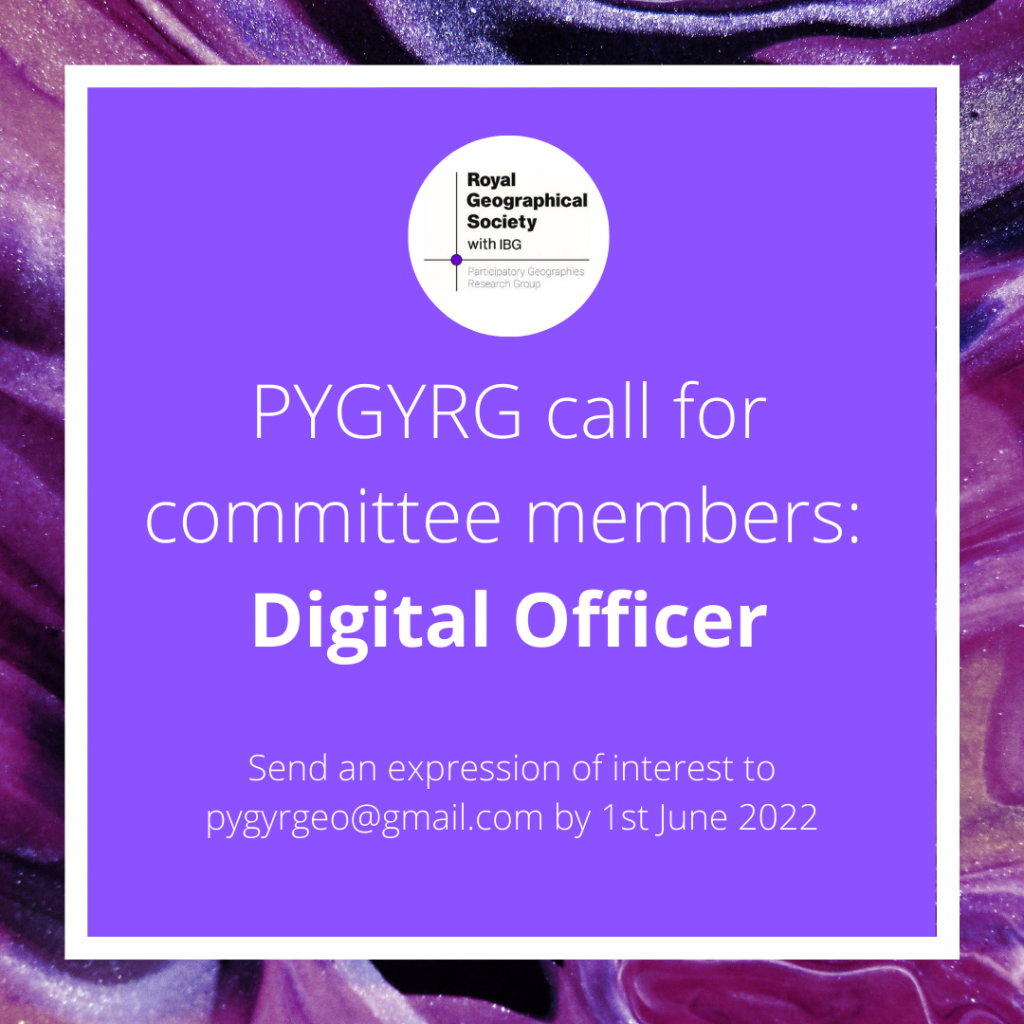Call for committee members: PYGYRG Digital Officer

The Participatory Geographies Research Group (PYGYRG) of the RGS-IBG are pleased to announce that we are opening nominations for the role of Digital Officer. Anyone – from any background (including PhD students) in geography or related subjects – is welcome to apply. To apply for the role, please send an expression of interest (up to 200 words including your name, contact details, and why you’re interested in the role) to pygyrgeo@gmail.com by the 1st June 2022. The anticipated start date of this role is September 2022. Full training and support for the role will be provided.
This role has traditionally been taken on by one person, however if we receive multiple applicants we will consider creating a ‘digital team’ to share responsibilities. Please get in touch with us at pygyrgeo@gmail.com if you have any questions or would like more information. We are also happy to arrange an informal chat if you’d like to know more about the committee and/or role!
About the role:
The role of Digital Officer involves uploading information, blog posts, and generally updating the committee’s website (https://pygyrg.org/), which is a WordPress site hosted by the RGS-IBG. Some experience of WordPress or similar is beneficial for this role, but not essential as full training will be provided (and the RGS-IBG is always available for support).
The Digital Officer will also have access to the committee’s Twitter account (@PYGYRG). The PYGYRG Twitter is run collaboratively by several members of the committee, however the Digital Officer will have full creative control. This might involve creating content, promoting events and opportunities, sharing relevant content from other RGS-IBG research groups, as well as any relevant content about participatory methods and approaches. As well as posting content requests from committee members, you are encouraged to be as creative as you like and post your own ideas for website and Twitter content.
Contributing to the management of the PYGYRG Twitter and website is a fantastic opportunity to develop website editing, social media, and communications skills. It’s also a brilliant way to connect with the wider participatory and geographic community – contributing to the PYGYRG Twitter helps you connect with wider audiences, stay up-to-date with new events and developments in the field, as well as helping to develop confidence and creativity posting on social media and communicating your research interests to a diverse online community.
About the committee:
PyGyRG is a collective whose members aim to raise the profile and perceived value, and further the understanding and use of participatory approaches, methods, tools and principles within academic geography and beyond:
- The participatory geographies research group is a broad and inclusive collective of academics and non-academics who value and practice participatory approaches, principles and methods.
- These participatory methods include a broad variety of tools alongside critical analysis of their utility, limitations and development.
- A participatory approach in academic geography includes collaborating with others as partners in improving equality, justice, and other progressive social change causes.
- We aim to work across all spaces and places, alongside attempts to widen participation in higher education geography.
- We support work that results in social change outside the academy and thus seek to widen the range of what are considered to be legitimate geographical knowledge and research activities.
- We aim to provide a space for mutual support orientated towards those engaging in participatory approaches, especially for those working within the increasingly pressured and competitive higher education context.
We understake a broad range of activities in order to encourage participatory approaches. This includes:
- Running training days
- Supporting each other in trying out new participatory approaches
- Publishing a monthly blog on recent research
- Running annual away weekends where we discuss methods, processes and principles
- Sponsoring conference sessions at the annual RGS/IBG Conference in England
- Writing papers together and editing special issues of journals
- Holding regional meetings inviting new people to understand participatory approaches
- Awarding masters dissertation prizes
- Sharing resources – readings, lectures and other material
- Sharing events and discuss issues on our email distribution list
- Holding an Annual General Meeting where we elect new officers and discuss plans for the year ahead. We do this at the RGS-IBG Conference and email the minutes to the PYGYRG email discussion list
- Organising keynote speakers for the RGS/IBG conference
- Participating in the Royal Geographical Society higher education committee and events